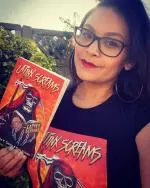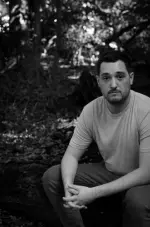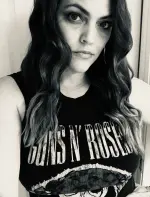As a Latinx poet and writer that often writes within the horror space, I have been pleased by the growth of Latinx representation in the genre.
I wanted to talk to several new, emerging, and widely published Latinx horror authors to understand what being a Latinx horror writer means to them, and find out what they hope to see in the future of Latinx horror.
These writers represent just a small sampling of Latinx voices writing horror fiction.
It is important to note that Latinx people are not a monolith. Our backgrounds, races, geographic locations, languages, belief systems, and our overall lived experiences vary. This means we are incredibly diverse groups, with rich stories to tell from unique perspectives.
There are of course many Latinx writers beyond those interviewed here whose work you should explore. Writers that have written horror and horror adjacent works, including J.F. Gonzalez, Silvia Moreno-Garcia, Ann Dávila Cardinal, Charlie Vázquez, Fernanda Melchor, Agustina Bazterrica, Carmen Maria Machado, Romina Garber, Sara Faring, and Isabel Cañas. There are also older works that should be explored, written by Ampario Dávila, Gabriel García Márquez, Jorge Luis Borges, Julio Cortázar, Carlos Fuentes, and more.
![]() V. Castro
V. Castro
What does being a Latinx horror writer mean to you?
Being a Latinx horror writer should have no meaning at all. Unfortunately, the reality of publishing is that we must identify ourselves to fight for space. We have to work harder and longer for what is given to others without a second glance. Because of this I feel I have a responsibility to be vocal about representation and do what I can to uplift others. I also have a burning desire to tell my story as a woman of color. All of this is to bring balance for future generations. Real change in representation cannot wait another day.
Where do you hope to see Latinx horror in the future?
I would like to see more of the stories from the oral tradition brought to the forefront. Less of a
struggle to become published. There are also many Latinx traditions from history that are pre-Columbian, filled with beauty and wonder. This would be wonderful to see interwoven into horror. Overall, we need wider representation.
About V. Castro
VIOLET CASTRO is a Mexican American writer originally from Texas now residing in the UK with her family. For More information about her books and other publications, please visit www.vvcastro.com.
She is also the co-founder of Fright Girl Summer, a website dedicated to women in
horror.
You can also follow her on Twitter and Instagram @vlatinalondon.
Get Goddess of Filth at Bookshop or Amazon
![]() Gabino Iglesias
Gabino Iglesias
What does being a Latinx horror writer mean to you?
The first thing being a Latinx horror writers means to me is positionality. It reminds me of my place of birth, the fact that English isn’t my first language, and that I have roots in a culture that's different from other writers. The idea that everyone is the same is as stupid as the idea that women can only write about how hard it is to be a woman or that members of the LGBTQ+ community can only write stories about the struggles of the LGBTQ+ community. That said, who we are has a huge impact in what we consume, what we think, and what we produce as writers. That’s why my horror is bilingual, and my characters look like me.
Where do you hope to see Latinx horror in the future?
The last couple of years have been decent in the sense that we have taken steps in the right direction. We’re getting more visibility, we’re bringing new voices and perspectives into horror. In five years, I hope Latinx—and LGBTQ+ fiction and BIPOC fiction—will be seen as normal, as a regular part of horror that simply has a different flavor.
About Gabino Iglesias
Gabino Iglesias is a writer, editor, journalist, and book reviewer living in Austin, Texas. He is the author of Coyote Songs, Zero Saints (both from Broken River Books), and Gutmouth (Eraserhead Press). He is the book reviews editor at PANK Magazine, the TV/film editor at Entropy Magazine, and a columnist for LitReactor and CLASH Media. His nonfiction has appeared in places like The New York Times, the Los Angeles Review of Books, the LA Times, El Nuevo Día, and other venues. The stuff that’s made up has been published in places like Red Fez, Flash Fiction Offensive, Drunk Monkeys, Bizarro Central, Paragraph Line, Divergent Magazine, Cease, Cows, and many horror, crime, surrealist, and bizarro anthologies. When not writing or reading, he has worked as a dog whisperer, witty communications professor, and ballerina assassin. His reviews are published in places like NPR, Vol. 1 Brooklyn, Criminal Element, The Rumpus, Heavy Feather Review, Atticus Review, Entropy, HorrorTalk, Necessary Fiction, Crimespree, and other print and online venues. He teaches at SNHU's MFA program. You can find him on Twitter and Instagram at @Gabino_Iglesias.
Get Coyote Songs at Bookshop or Amazon
![]() E. Reyes
E. Reyes
What does being a Latinx horror writer mean to you?
Being a Latinx Horror Writer—to me—means that I get the chance to represent the Mexican-American part of the spectrum. And by representing that part, I can tell and show how I grew up, write about the myths and legends of my culture, and I get to bring a whole different perspective and way of living to people unfamiliar with it. I also get to write relatable and familiar things to people like me who feel outcasted or underrepresented as a Mexican-American when reading books. Being a Latinx Horror Writer means a lot to me, and it lets me be the real me.
Where do you hope to see Latinx horror in the future?
In the future, I hope to see all parts of Latinx Horror being shown and represented in more mainstream media such as books, movies, and streaming. I hope to see more of a demand for it from people who are actually of Latinx descent, and I hope we see more stories told from those perspectives. And what I want to see and happen is more kids, teens, and younger people, in general, to be inspired by the movement and feel that they can do it, too. I hope to inspire a Mexican-American reader and writer and show them that someone else is out there writing horror and using their voice and views and background without obscuring it.
About E. Reyes
E. REYES is the author of The House on Moon Creek Avenue, Devil’s Hill, and The Halloween Grindhouse. His story “Behind the Mountain” was published in the Burial Day Books anthology Latinx Screams. He is currently working on a new horror novel and the Jack Forest series. He currently lives in the real city that Devil’s Hill is based on with his wife and their three kids. You can find him at: EReyesAuthor.com and twitter and Instagram @ EReyesAuthor.
Get The House on Moon Creek Ave at Bookshop or Amazon
![]() Jonathan Torres
Jonathan Torres
What does being a Latinx horror writer mean to you?
Believe it or not, one of the biggest influences on my writing isn’t an author. In fact, the influence that fuels my creativity, inspiring and giving life to my stories, is this tiny 3,515 square-mile island of enchantment known as Puerto Rico. For those of you who don’t know, Puerto Rico’s history is rich in language, culture, and religion, yet rife with trauma, stemming from the brutal colonization and gentrification of its land and people. Yet, the end result? A
cultural identity and resilience so distinct, it’s out of this world.
As a Latinx horror writer, I always strive to write my own takes on traditional horror themes and tropes, while incorporating blends of my own signature styles, flavors, perspectives, and spins on these elements in hopes of providing my readers with a fresh experience. I do this, of course, with a diverse cast of characters, as diverse as you’ll find them on the island, who break free from the stereotypical mold that publishing has placed them in.
Because every Latinx writer’s experience is solely unique to them, tailored specifically to their own traditions, histories, and traumas, there is no universal definition or absolute way to describe what it means to be a “Latinx horror writer.” However, if you were going to ask me, I’d say my job is to create an effective way of communicating stories unique to my people, stories that can easily be applied to real-life situations, to readers who don’t know who we are. Because in the end, I want those readers to appreciate our traditions, culture, music, foods, yet feel our
pain, fear, and traumas.
Where do you hope to see Latinx horror in the future?
In recent years, Latinx horror writers continue to bring the heat to the publishing industry, giving horror fans solid book releases that are “must haves” on their bookshelves. Classics like Coyote Songs and Zero Saints by Gabino Iglesias, Children of Chicago by Cina Pelayo, Five Nights by Ann Davila Cardinal, and Goddess of Filth by V. Castro remain staples in the movement, paving the way for Latinx horror fiction, as well as for aspiring writers looking to tell their own stories. However, I believe whatever has been accomplished thus far is only scratching the surface of what’s to come in the future.
So, what would I like to see? Moving forward, I want to see Latinx horror writers continue to push boundaries and conventions, seeing how far they can bend them to their will. In addition, and most importantly, I would love to see Latinx horror marketed, promoted, and represented fairly so that our stories can reach larger audiences across the world. And while the road won’t be easy, I’m confident that we will continue to use our voice and our stories to push
forward together.
About Jonathan Torres
JONATHAN TORRES is a horror writer hailing from Nueva York. His first short story, “The Whistler,” was published in Nico Bell’s Shiver anthology in 2021. When he’s not holed up in his house, strung out on coffee or pulling his hair out over his work-in-progress, Jonathan enjoys reading, watching movies, and spending time with his family and cat-child, Alayne. You can find him on Twitter at @Ficciondetorres or at Instagram at @Ficciondetorres.
Get Shiver at Amazon
![]() Gaby Triana
Gaby Triana
What does being a Latinx horror writer mean to you?
To be honest, I never thought of myself as a Latinx writer when I started out in 2001. I wanted to “fit in.” I thought that revealing my Cuban-American-ness might hurt sales. Over the years, as the push for diversity in publishing grew, I came to understand that my heritage was to be appreciated, not hidden. Being a Latinx horror writer means I have a unique viewpoint into shitty situations that the majority of other writers don’t, so I may as well put it out there.
Where do you hope to see Latinx horror in the future?
I want to see more Latinx writers feeling like they belong, and I want to see more Latinx stories translated to the big screen as well. I want to see writers, regardless of who they are or where they come from, feeling free to write about any emotional situation, not just Latinx pain, or Black pain, or LGBTQ pain. Ironically, I also hope for a day when anyone can pick up a book by any author of any culture and just enjoy the damn story without labels. We have more in common than we have differences.
About Gaby Triana
GABY TRIANA is the bestselling author of 17 novels for teens and adults, including the Haunted Florida series (Island of Bones, River of Ghosts, City of Spells), Wake the Hollow, Cakespell, Summer of Yesterday, a tribute to Walt Disney World’s River Country, and Paradise Island: A Sam and Colby Story. She’s a short story contributor in Don’t Turn Out the Lights: A Tribute Anthology to Alvin Schwartz’s Scary Stories to Tell in the Dark, a flash fiction contributor in Weird Tales Magazine Issue #365, and the host of a horror-based YouTube channel called The Witch Haunt. Published with HarperCollins, Simon & Schuster, Permuted Press, and Entangled, Gaby writes about witchy powers, ghosts, haunted places, and abandoned locations. She’s ghostwritten over 50 novels for bestselling authors, and her books have won IRA Teen Choice, ALA Best Paperback, and Hispanic Magazine’s Good Reads Awards. She lives in Miami with her family and is at work on her next novel.
You can find Gaby at www.GabyTriana.com and Twitter and Instagram at @GabyTriana.

About the author
Cynthia Pelayo is a Bram Stoker Award winning and International Latino Book Award winning author and poet. Pelayo writes fairy tales that blend genre and explore concepts of grief, mourning, and cycles of violence. She is the author of Loteria, Santa Muerte, The Missing, Poems of My Night, short stories, poems, and more.
 V. Castro
V. Castro
 Gabino Iglesias
Gabino Iglesias
 E. Reyes
E. Reyes
 Jonathan Torres
Jonathan Torres
 Gaby Triana
Gaby Triana








